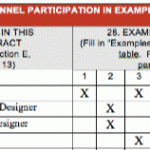 The vice president of a construction consulting firm sent me an email after reading my SMPS whitepaper, “Marketing to the Mind.”
The vice president of a construction consulting firm sent me an email after reading my SMPS whitepaper, “Marketing to the Mind.”
Here is the question he asked: “How does one best apply these techniques to a crowd mainly composed of business development or marketing personnel? The vast majority of the national conferences and monthly organizational lunches I attend are predominantly attended by BD personnel and I get the feeling in talking with them that they are prepared for these approaches and prepared with a response. Is there a different approach for this type of audience? Is the goal to meet/use the BD person to gain access to a more senior decision maker to then use these techniques? Being a small business and trying to work/sub with large business pretty much working with/through the BD person. I have found I have tried all of your recommendations to some degree but unfortunately have not met with the reciprocation I was expecting. I get the feeling from those I attempt to stay in contact with through forwarded RFQ/RFP and other information I think would be beneficial and useful to them…as just information no strings attached per se. I find I get more of a cold response to no response…and very rarely any reciprocation of information. I do not want to believe they do not like me just that they are busy and when they need the services of our company they will call. It is not necessary for me to stay in contact with this type of information.”
Here is the response I sent him:
The weapons of influence are the six principles that have been proven effective in the largest variety of circumstances. Whether you are applying them to an owner or a prime is irrelevant. The principles work the same for both. With regard to how you would apply the weapon of influence known as “reciprocation,” I can offer some enhancements to your approach. Just to review, the principle of reciprocation is: when we feel indebted to someone, we are more likely to comply with their request.
The Importance of Significance
First, to get reciprocation the other person has to feel indebted to you. If you send me an RFP I already know about, I’m not going to feel like I “owe you one.” Before you give someone a “gift,” ask yourself, “will the recipient view this as being of significant value?” Let’s say I give two girls each a bouquet of flowers. One girl’s face lights up. When I ask her to the dance, she says, “Of course, I’d love to be your date.”
In contrast, the other girl shrugs her shoulders and throws it in a pile of bouquets she received from other suitors. When I ask her to the dance, she says, “I don’t know. Maybe next time.” Which girl should I give the next bouquet to? I would argue that you should give flowers to the girl who reciprocates. The second girl doesn’t see flowers as having “significant” value. Giving her more flowers is not going to solve the problem. But, let’s say I decide to write her a love poem. When she reads my love poem, her face lights up. I ask her to the dance and she says, “Absolutely! I’d love to.”
Now I have found something that the second girl perceives to be of significant value. Now, there are some girls who just aren’t willing to go to the dance with you. Maybe she’s going steady with the quarterback. There is nothing you can reasonably give her that will get her to go with you. You have to be able to recognize that (I’m going to leave it at that in order not to digress*). The lesson here is what one person perceives to be significant is different from what another person perceives to be significant.
The Two Parts of Reciprocation
Here is the next point. Remember how I asked each of the girls to the dance? That is significant because there are two parts of reciprocation. The first is giving. The second is asking for reciprocation. You may have been ignoring the second piece. That’s a fatal mistake. It is essential that you ask for reciprocation. Don’t be a jerk about it. I wouldn’t say, “Now that I’ve given you flowers, how about going to the dance with me?” A simple, “Would you like to go to the dance with me?” works just fine. If I just assumed that the girls would ask me to the dance, I’d probably be spending the dance at home with my mother.
One girl out of 1,000 might ask you to the dance. But that is the exception, not the rule. You need to ask the girls to the dance. I often hear people complain that they give out bouquets, but the girls never ask them to the dance. I’m shocked that they don’t see the obvious flaw in their approach.
The Importance of Time
Here is another item to note. There has to be some time between the gift and the asking. It is not going to be effective if you give something of value and then immediately turn around and ask for reciprocation. Give it some time. But again, be sure to ask for reciprocation.
Decision Makers
For someone to reciprocate, they need to have the ability to provide you with that reciprocation. I often say that a marketing coordinator sometimes has more say in what subs get picked than the CEO. That’s because the marketing coordinator spends more time involved with proposals than the CEO of a large organization. Let’s go back to the girls I want to take to the dance. Some girls may be forced to go with a boy her dad really likes/approves of. If you have a girl’s dad on your side, he may force his daughter to go with you. But whether that happens depends on the family dynamics.
If you want to go to the dance with the girl, you need to understand who is making that decision. If the girl is an independent thinker, your best approach is to focus on using the reciprocation weapon of influence directly on her. So, if the business developer decides who to put on the team, that’s who you target. But if it is someone else, then targeting the business developer isn’t the best approach.
Using Multiple Weapons of Influence Together
Another way you can enhance your approach is to not just focus on reciprocation. If you have a girl’s best friend on your side, that may help get you to the dance. When her best friend (influencer) says, “you should take him to the dance because he’s really cute,” that’s going to help you out because of “authority” and/or “social proof.” In fact, sometimes that may be all you need.
I can give you many examples where influencers played a large part in the makeup of proposal teams. If you give the girl flowers AND she has her best friend whispering in her ear about you, you can see how much more powerful that is.
*Ok, now I can digress. Let’s get back to the girl going steady with the quarterback. She is going to want to behave consistently. So, she’s going to attend the dance with the quarterback. But what if she fell in the creek and you jumped in and saved her life while her boyfriend just stood there. Now, she is armed with new information to make her decision. With that act, maybe you are more of a hero than the quarterback.
Therefore, going to the dance with you is constant with her earlier decision to date the quarterback. In addition, let’s say that you get her best friend whispering in her ear about how dreamy you are, her dad pressuring her to go with you, and all the other girls in the class openly salivating over you. Not to mention, you have written her a love sonnet that would make Shakespeare cry. If I was a betting man, I would say that the likelihood of her saying, “yes” when you ask her to the dance is quite high. This is because multiple weapons of influence are being leveraged against her at the same time. I’m not sure what defense she could put up against that.





Speak Your Mind